It’s Tuesday 7 April 2020 and there had been c. 800 COVID-related deaths in the UK that day, with similar numbers in Canada and USA.
International travel is all but banned in an attempt to stop the spread of Coronavirus.
No one knows when travel restrictions will
International travel is all but banned in an attempt to stop the spread of Coronavirus.
No one knows when travel restrictions will
be lifted, or how many subsequent outbreaks governments around the world might have to deal with.
What better time, therefore, to explore one’s baby buying options?
What better time, therefore, to explore one’s baby buying options?
http://MySurrogacyOptions.com"> http://MySurrogacyOptions.com is run by Adam and Chris, a gay couple, who run information events linking people in the UK to Canada’s surrogacy market for no apparent financial profit.
I decided in the end to use the terminology they used, i.e. Intended Parent (IP) and surrogate, as opposed to Baby Buyers and Gestational Mother, to best reflect their words and the tone.
The sound quality was appalling, hearing responses to questions given several minutes after they were originally uttered.
The time lag was so long (several minutes) I wondered whether some of the presentations were recordings and some other technically difficult had arisen?
The time lag was so long (several minutes) I wondered whether some of the presentations were recordings and some other technically difficult had arisen?
The Canadian Fertility Options’ clinic gave advice, explaining the process.
First of all ‘intended parents’ need to have a general health check, including infectious diseases, by their chosen clinic.
IPs should ask the IVF clinic about their success rates and their oversea
First of all ‘intended parents’ need to have a general health check, including infectious diseases, by their chosen clinic.
IPs should ask the IVF clinic about their success rates and their oversea
rates, if you need an egg donor do you need to find that on your own? Is the clinic open to working with a surrogate?
Make contact with a fertility lawyer early, and know what the legal situations are in other countries. A surrogacy agency should be an intermediary between the
Make contact with a fertility lawyer early, and know what the legal situations are in other countries. A surrogacy agency should be an intermediary between the
various organisations involved in the process.
With regards to your surrogate - ask about where she lives? What type of relationship does she want before and after? How would she feel about selective reduction or an abortion for abnormality?
With regards to your surrogate - ask about where she lives? What type of relationship does she want before and after? How would she feel about selective reduction or an abortion for abnormality?
Adam asked what the best way was to expedite the matching time with a surrogate.
Be open to a surrogate to anywhere in Canada - most generally live in smaller communities.
(I wonder why would that be? Red flag for people trafficking?)
Be open to a surrogate to anywhere in Canada - most generally live in smaller communities.
(I wonder why would that be? Red flag for people trafficking?)
Many IPs apparently hope for a surrogate to be a nurse or healthcare worker who ‘understands this process’, but said Cindy you had to take into consideration that it might cost $800 per week to cover wages if there was a medical complication and the
surrogate needed to be off work in bed for the duration, (and thereby implying that you really needed a woman to be desperate for the cash). It generally takes 6-9 months to make a match.
Think about your budgetary requirements and then add 20% contingency fee upon them.
Think about your budgetary requirements and then add 20% contingency fee upon them.
The previous pregnancies of surrogate will be reviewed. The surrogate will be reviewed by that doctor to be educated on the entire process.
IVF pregnancies are managed very different in terms of no. of ultrasounds required.
IVF pregnancies are managed very different in terms of no. of ultrasounds required.
At no point was it mentioned that surrogate were risking their lives and their future health, but tucked away in the written materials emailed after was a costing for the surrogate’s will.
Adam asked Dr Said Danashmand (hereafter Dr D) how IPs should approach fertility clinics?
Dr D said he held Skype consultations and that diagnostic tests could be performed in England and had been working like that for 15 years.
Dr D said he held Skype consultations and that diagnostic tests could be performed in England and had been working like that for 15 years.
It broke down into 3 parts: analysis of sperm, egg donor and the surrogate. Sperm was assessed for concentration, motility, morphology. Often sperm is improved with injections of vitamins, antioxidants, sometimes even *medications* (‘washing’ HIV+ sperm?), before freezing!
A saliva test kit would be sent in the post to check for recessive mutations.
Dr D’s clinic has their own database of egg donors - all Canadian women - who have all been psychologically tested and a general health check to eliminate genetic illnesses and poor quality eggs.
Dr D’s clinic has their own database of egg donors - all Canadian women - who have all been psychologically tested and a general health check to eliminate genetic illnesses and poor quality eggs.
IPs can be comfortable that they have been prescreened.
An appt will be made in San Diego or New York where the embryo will be made and to meet with the clinic team. IVF cycles will be started after viable embryos have been produced - normally using an injection of a single
An appt will be made in San Diego or New York where the embryo will be made and to meet with the clinic team. IVF cycles will be started after viable embryos have been produced - normally using an injection of a single
sperm into an egg.
When the embryo is about 5-6 days old (about 128 cells) a biopsy is performed to check on chromosomal abnormalities.
Dr D said that there was no difference between ‘fresh and frozen’ embryos in terms of success rates and health of babies.
When the embryo is about 5-6 days old (about 128 cells) a biopsy is performed to check on chromosomal abnormalities.
Dr D said that there was no difference between ‘fresh and frozen’ embryos in terms of success rates and health of babies.
You can then start your search for an appropriate surrogate as they recommend freezing the embryo. Surrogates need to be healthy with good previous pregnancies.
Surrogate comes for individual screening at Dr D’s clinic - only lasts one day (he meant a couple of hours I expect) and described it as a ‘very special visit’ where the surrogate gets to meet the team who will ‘help her& #39;.
Once the tests show that the surrogate will be useful then you contact your attorneys in Canada to complete the legal contracts.
Then preparation of uterus is begun for embryo transfer.
When ‘uterus is ready’ the surrogate flies over to the clinic, transfer
Then preparation of uterus is begun for embryo transfer.
When ‘uterus is ready’ the surrogate flies over to the clinic, transfer
takes place and surrogate rests for 24 hours, then flies back, then pregnancy test ten days later. Surrogate ‘graduates’ after 10 weeks of pregnancy, as there is less risk of miscarriage, and is then referred to healthcare providers in Canada.
Agency and clinic will be in constant communication throughout.
Dr D said his clinic has amazing success, with single embryo transplant with a success rate of 81% pregnancy rate and delivery (which still leaves one-fifth resulting in failure and possible terminations, etc).
Dr D said his clinic has amazing success, with single embryo transplant with a success rate of 81% pregnancy rate and delivery (which still leaves one-fifth resulting in failure and possible terminations, etc).
Dr D said that he was ‘inspired by heart of the surrogates and the feelings they have in terms of wanting to help IP to create a family’. And that it was inspiring to help IP achieve their goal of creating their families.
Note the cult-like handmaiden language.
Note the cult-like handmaiden language.
Adam asked was it really the case that fresh embryos weren’t better?
Dr D responded studies had shown no difference and IPs can feel confident pursuing frozen options.
Then Adam said that in terms of logistics it was much easier (he meant cheaper) to transport frozen material.
Dr D responded studies had shown no difference and IPs can feel confident pursuing frozen options.
Then Adam said that in terms of logistics it was much easier (he meant cheaper) to transport frozen material.
Dr D said the clinic was developing non-invasive ways of carrying out chromosome analysis of embryos. Currently they do a biopsy. They had a research grant from a major US genetics company to develop a way of analysing the DNA the embryo sheds into the fluid it grows in instead.
Chris then took over - at what stage should IP engage with lawyers?
Cindy introduced herself. She is a fertility lawyer with 11 years experience, based in Toronto. Hope Springs is the largest specialist fertility law firm in Canada with 5 lawyers. Cindy used to be a criminal
Cindy introduced herself. She is a fertility lawyer with 11 years experience, based in Toronto. Hope Springs is the largest specialist fertility law firm in Canada with 5 lawyers. Cindy used to be a criminal
lawyer for 20 years, had married late and then ‘experienced infertility due to age’ (in other words post menopausal https://abs.twimg.com/emoji/v2/... draggable="false" alt="🙄" title="Face with rolling eyes" aria-label="Emoji: Face with rolling eyes">).
https://abs.twimg.com/emoji/v2/... draggable="false" alt="🙄" title="Face with rolling eyes" aria-label="Emoji: Face with rolling eyes">).
15 years ago she and her husband used surrogacy and also needed an egg donor too.
15 years ago she and her husband used surrogacy and also needed an egg donor too.
Cindy got involved with the business because she wanted to help other IPs to have a better experience and doesn’t just do contract law, but also lobbies local and federal govt and prove to improve the process.
Cindy had personally got the law changed to change immigration law so that IPs can move about internationally with regards to the COVID 19 pandemic for the birth of children and get passports sorted out.
Chris and Adam are her clients.
Chris and Adam are her clients.
Chris asked (for possibly the 3rd time) at what point should IP engage with lawyers?
Cindy - contact us! From an ethical perspective a lawyer has the back of the client in the process - most want back up from outset. Offers free consultation at first. You need a surrogate in
Cindy - contact us! From an ethical perspective a lawyer has the back of the client in the process - most want back up from outset. Offers free consultation at first. You need a surrogate in
a province that benefits you (from a legal perspective I imagine).
Chris - what is the benefit of working with an American clinic when surrogate is in Canada?
Feedback problems meant Dr D’s answer wasn’t heard in full but he said had had over 20 years experience and had done
Chris - what is the benefit of working with an American clinic when surrogate is in Canada?
Feedback problems meant Dr D’s answer wasn’t heard in full but he said had had over 20 years experience and had done
research into preventing ovarian-hyperstimulation in egg donors, which could cause serious fluid retention, resulting in admissions, even death, and had developed a protocol using different medications to stop this. Research is key to improving and maximising success rates.
Cindy assemblies team that will support you and your surrogate. A therapist is on staff which you will have access to throughout.
In contrast, there is a ‘vibrant online community’ to support the surrogate and who they can go to ask questions (i.e. no professional support).
In contrast, there is a ‘vibrant online community’ to support the surrogate and who they can go to ask questions (i.e. no professional support).
To make this sound more meaty, Cindy said during this time of quarantine we are finding out how vital and important online connection is.
Chris mentions that 3-4 years ago, he and Adam ‘lost one twin’, but due to sound difficulties I couldn’t make out more.
Chris mentions that 3-4 years ago, he and Adam ‘lost one twin’, but due to sound difficulties I couldn’t make out more.
When Cindy went through the process herself she was ‘insulted that she had to apply to judge be the mother of her husband’s child’ - so wanted to get that changed immediately, and now there is a ‘Declaration of parentage’ in which the IPs ask that the surrogate is not to be
registered as parent.
Admin process has been changed in British Columbia - a statutory declaration means a court order isn’t necessary which works well for those in the UK, as it can be be done the moment the baby is born.
Admin process has been changed in British Columbia - a statutory declaration means a court order isn’t necessary which works well for those in the UK, as it can be be done the moment the baby is born.
Ontario has chosen an ‘arbitrary’ cooling off period for surrogate of 7 days, however this can be gotten around if the IP and surrogate have a different agreement which was approved by two independent lawyers.
In the current pandemic situation Cindy was keen to emphasise that passports could be processed in one day - there are two emergency passport offices in Canada where it takes just 3 hours.
Once you have a passport, you can return home.
Once you have a passport, you can return home.
In Ontario frequently allow IPs 14 days post birth, and in some other provinces the surrogate has to be registered as the mother.
Chris said it only took 3 weeks for he and Adam and that in the UK IPs have to apply for a Parental Order, which is fairly
Chris said it only took 3 weeks for he and Adam and that in the UK IPs have to apply for a Parental Order, which is fairly
straightforward, but advised that people consult with lawyer in UK and recommended Andrew, who was not available for the webinar and that a follow up webinar would be organised.
‘Declaration of Parentage’ from Canada is not recognised in the UK
‘Declaration of Parentage’ from Canada is not recognised in the UK
- important you understand the requirements of your countries, to ensure that the surrogate does not have legal responsibilities.
There is a time limit on making the Parental Order application in UK - can’t be done within 6 weeks post-birth, but must be done within 6 months.
There is a time limit on making the Parental Order application in UK - can’t be done within 6 weeks post-birth, but must be done within 6 months.
Cindy said that Canada was leading the way on dealing with surrogacy and the COVID pandemic. Cindy had been in the senate on 12/03/20 listening to the second reading of bill of decriminalisation of surrogacy. It was then announced that schools would close that day.
They called round their clients immediately to get them over ASAP. And then they called other surrogacy agencies, and word spread through the networks.
Most of Cindy’s clients managed to get in, despite the travel ban being raised a few days later.
Most of Cindy’s clients managed to get in, despite the travel ban being raised a few days later.
Senior civil servants in immigration were contacted and Hope Springs explained that the immigration act would not allow IP travel.
Within a week travelling for IPs had been approved as & #39;essential travel& #39;.
Within a week travelling for IPs had been approved as & #39;essential travel& #39;.
Cindy reported that no one was being refused entry into Canada, but that other countries were more difficult (hint, hint, come to Canada).
Cindy said how proud she was of her country that twins destined for Belgium were registered in one day and emergency passport issued and the babies and the IPs were on the next flight out of the country.
Adam and Chris plan on doing more webinars during this UK lockdown, in close association with Hope Springs and Canadian Fertility Consulting.
@threadreaderapp please unroll

 Read on Twitter
Read on Twitter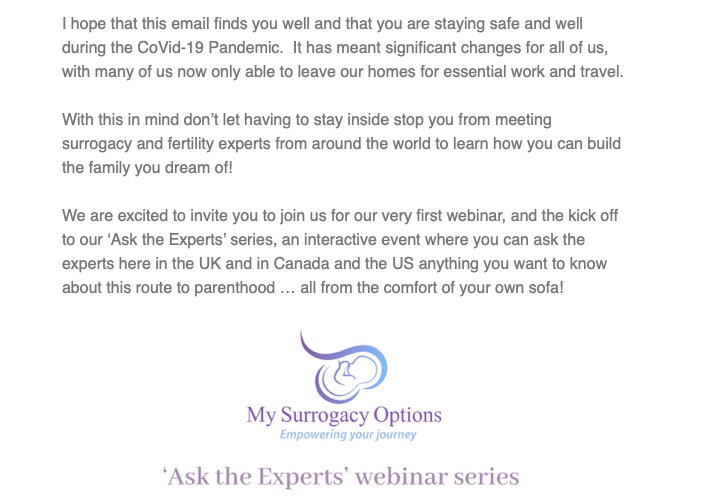

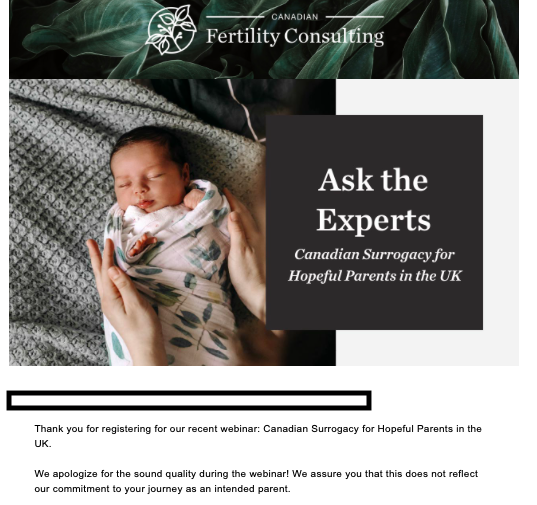
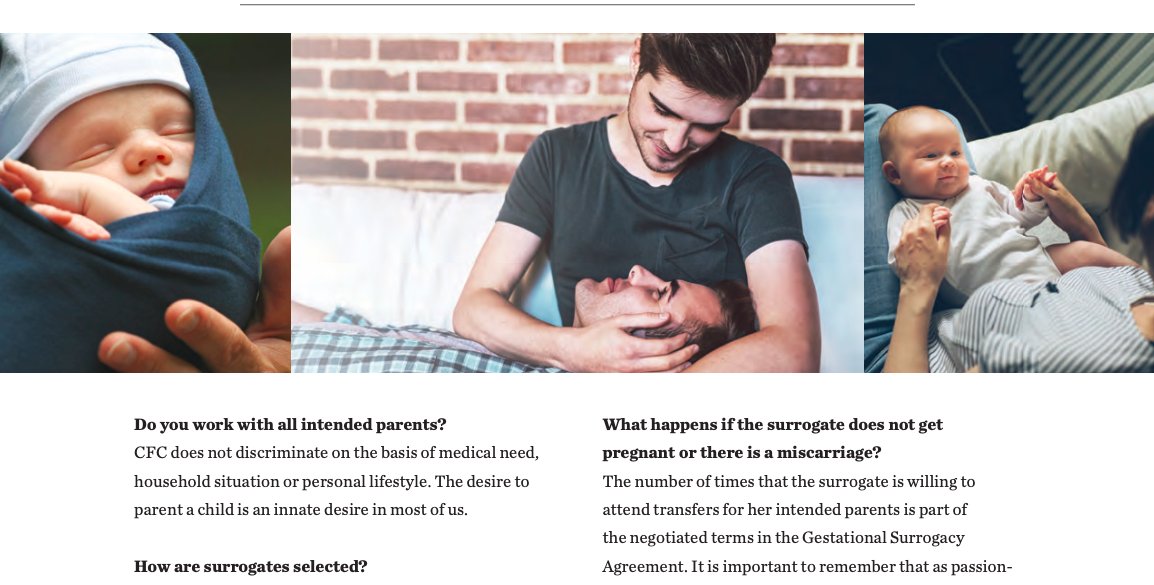


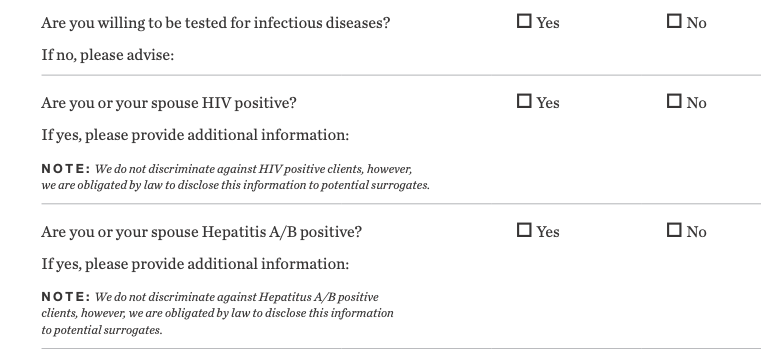


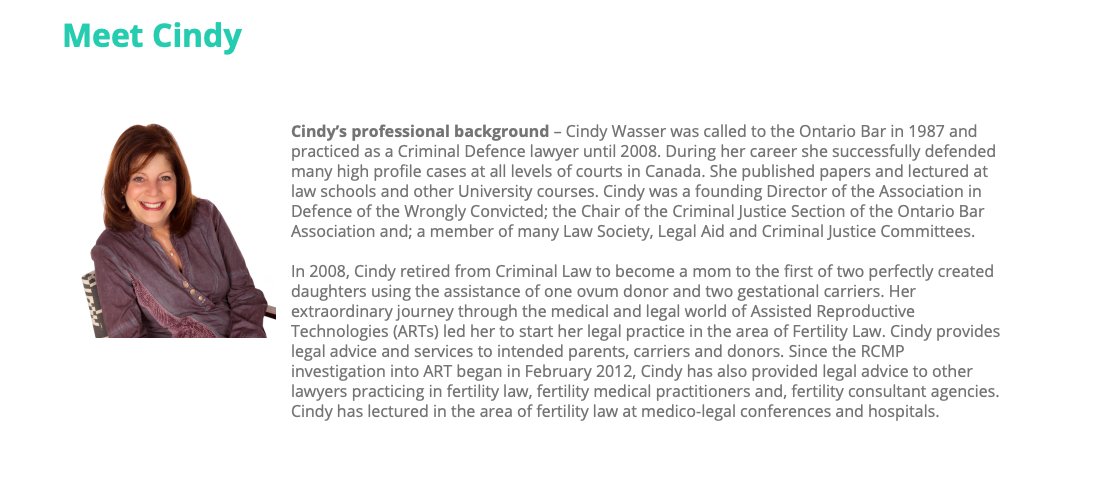 ). 15 years ago she and her husband used surrogacy and also needed an egg donor too." title="lawyer for 20 years, had married late and then ‘experienced infertility due to age’ (in other words post menopausalhttps://abs.twimg.com/emoji/v2/... draggable="false" alt="🙄" title="Face with rolling eyes" aria-label="Emoji: Face with rolling eyes">). 15 years ago she and her husband used surrogacy and also needed an egg donor too." class="img-responsive" style="max-width:100%;"/>
). 15 years ago she and her husband used surrogacy and also needed an egg donor too." title="lawyer for 20 years, had married late and then ‘experienced infertility due to age’ (in other words post menopausalhttps://abs.twimg.com/emoji/v2/... draggable="false" alt="🙄" title="Face with rolling eyes" aria-label="Emoji: Face with rolling eyes">). 15 years ago she and her husband used surrogacy and also needed an egg donor too." class="img-responsive" style="max-width:100%;"/>


